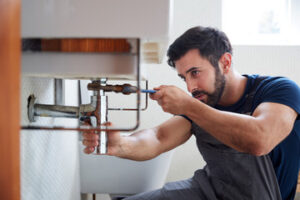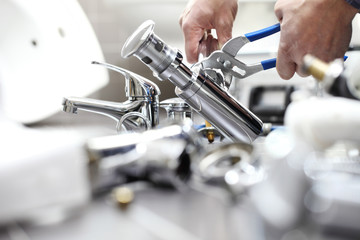Common Plumbing Emergencies That Require the Attention of an Emergency Plumber
Many different plumbing issues might need the attention of an emergency plumber. While some can be put off for a while, others should be dealt with immediately to prevent severe damage to your home.
If you suspect you have a burst pipe, turn off your water supply and call Emergency Plumber Tampa immediately. It would help if you also tried to save any belongings you can from the flooding.
A burst pipe is one of the most serious plumbing emergencies you can face. The water from a burst pipe can cause major damage to your home and belongings, and it may also create a health hazard if it comes into contact with your food or waste. If you suspect that a pipe has burst, shut off your home’s water supply immediately to minimise the damage and prevent further complications.
You should also call an emergency plumber if you notice extensive water leaks, dampness or discolouration in your home, strange noises coming from your plumbing fixtures, or the sound of running water even when the taps are turned off. Other signs of a potential water leak include an unexplained increase in your water bill, musty odours around drains or in your home’s walls or ceiling, and sagging ceilings.
Water leaks can cause expensive damage to your property, and they can also lead to mold growth, which poses a health hazard to you and your family. An emergency plumber will be able to find the source of the leak and repair it before it gets worse.
Another common emergency plumbing problem is a blocked sewer line. If your sewer lines are backed up with sewage, it can affect your whole home and even the surrounding yard. You may notice a foul smell, which is typically described as having a rotten egg or sulfur odor. You may also see sewage water backing up into your toilets or sinks.
Blocked drains are a common plumbing emergency, and they can occur at any time. They can be caused by a wide range of issues, from tree roots infiltrating the line to blockages created by fats, oils and grease. When you have a blocked drain, it’s important to act quickly to avoid further damage to your pipes and the surrounding environment. A good emergency plumber will be able to clear the blockage quickly and efficiently using a variety of methods. They should also be able to advise you on how to prevent future blockages.
Blocked Drains
Whether from food scraps, hair, grease or other household waste, blocked drains are not only unpleasant, but they can also cause flooding, health issues and even structural damage to your home. Emergency plumbers can help with the removal and cleaning of these obstructions. They can even use a more targeted approach to unblock your toilets and drains, using cameras and other special equipment to get to the root of the problem.
If you have a blocked drain, it’s important to turn off any water sources linked to that drain before calling an emergency plumber. This will reduce the risk of further damage and prevent any chemicals or other harsh substances from entering your home’s water supply. You should also stop using any products that can potentially aggravate the blockage, such as chemical drain cleaners. If you can, try dislodging the clog with a plunger or drain snake before calling in a professional.
Some clogs are too stubborn and need the attention of an emergency plumber. Any drain that doesn’t seem to be getting any better should be considered an emergency, as it could worsen over time and lead to more serious issues. This is especially true for toilets, as a blocked toilet can flood your home and cause major damage in a short amount of time.
Another sign that you need an emergency plumber is if you notice water leaking into your home. This is a sign of a leaking pipe, which can cause extensive and expensive flooding damage if left untreated. Emergency plumbers can fix this problem quickly and efficiently before the damage gets out of hand.
When hiring an emergency plumber, be sure to ask for references and check their credentials before making a decision. You should also make sure that they have experience working on homes similar to yours. You can usually find customer reviews online as well, which are a great way to determine if a plumber is right for you. Having these details at hand before a plumbing emergency occurs can save you a lot of stress and money in the long run.
Frozen Pipes
Frozen pipes are a common problem during cold weather. As water freezes, it expands, putting immense pressure on the pipe, which can lead to cracking and bursting. If left untreated, frozen pipes can lead to severe water damage in your home and require costly repairs. If you suspect that a pipe is frozen, turn off your water supply and contact your emergency plumber right away. The plumber will arrive with thawing equipment and the expertise to safely thaw your pipe without damaging it. In addition, the plumber will be able to provide advice on how to prevent future frozen pipes from occurring in your home.
In the meantime, you can try to thaw your own pipes by applying heat to the frozen area. You can use a hairdryer, heating pad or space heater to warm the frozen section of the pipe. However, if you cannot find the frozen section of the pipe or it is located inside a wall or cabinet, you should call your plumber right away.
When a frozen pipe bursts, it can cause flooding and water damage throughout your home. Moreover, the leaking water can create an ideal breeding ground for mildew and mold, which can pose health problems. Consequently, prompt action by an emergency plumber will minimize the risk of water damage and protect your family’s health.
To prevent frozen pipes, you should insulate your basement and crawl spaces and seal any gaps or cracks. In addition, you should keep the thermostat set at a reasonable temperature and shut off any unnecessary water appliances. Finally, you should check the exterior of your home for frosty areas and consider installing heat cables or a heat pump. Additionally, you can use a programmable thermostat that adjusts the heat output based on the outside temperature. There are also special alarms that will notify you of a change in water temperature, which is an effective way to monitor your home during cold snaps.
Sewer Backups
Sewer backups can be dangerous and should always be handled by a professional. If left untreated, sewage can cause significant damage to your home and surrounding property. The best way to prevent a sewer backup is to have your plumbing regularly inspected and maintained. A good plumber will be able to identify issues before they become an emergency and repair them accordingly.
Sewage backups happen when there is a clog in your sewer line. The most common cause of this is flushing things down the toilet that should not be there like feminine products or diapers. These items will expand when they are flushed and block off the pipe. Other causes of a clog can include root infiltration, debris in the line or a broken pipe. If you have a sewer backup, you will need an emergency plumber to resolve the problem as quickly and safely as possible.
A sewer backup is a health hazard because it contains all the waste from your home. The smells, bacteria and pathogens can be very harmful to your family’s health. If there is sewage back up in your house, you should turn off the water supply and seek medical help immediately. You should also wear protective clothing, including rubber boots, face masks and eyeglasses when dealing with sewage.
The most obvious sign of a sewer backup is when multiple drains are backed up at once. This is usually caused by a large clog in the main line that is affecting your entire plumbing system. This issue will require the use of a heavy-duty drain snake to clear.
Some of the causes of a sewer backup are out of your control, such as storms or the age of the pipes. If the city sewer is at fault, you will not be able to get them to pay for your repairs. You can minimize the risk of this by ensuring that your yard is properly landscaped and you remove any trees that are overhanging your pipes. You can also have a plumber install catch basins to manage stormwater runoff and prevent it from flowing into your home’s plumbing.



